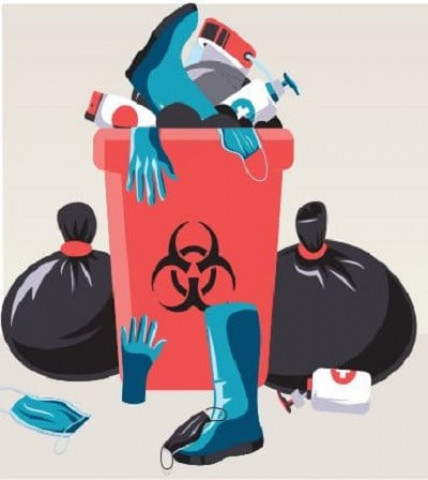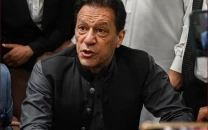Hazardous pandemic medical waste piles up
Covid-19 has created a plastic nightmare for which the country has no plan as of yet

The by-product of the superspreader, medical waste, if not properly disposed will haunt the country’s environment for years to come and the lack of a plan in its disposal intensifies the threat.
A recently published research article titled ‘Plastic waste release caused by Covid-19 and its fate in the global ocean’, a copy of which is available with the Express Tribune, reveals that more than eight million tons of pandemic-associated plastic waste has accumulated across the globe, with more than 25,000 tons entering the oceans. In Pakistan’s context, improper disposal of Covid-19 related waste like masks, face shields, gloves, protective gear, and nasal swabs is evident across the country as it is mixed with regular waste instead of being put through a medical waste incinerator as required by the law.
In the country’s most populous province, Punjab, 48,804 hospitals of various sizes across the province, discharge about 4,500 tons of waste daily as per estimates. The catch, however, according to sources privy with the matter, is that the waste in its entirety never makes it to a designated medical waste dumping site near Kasur, as hospitals’ staff sell it beforehand.
Read: 70% students aged 12 to 17 fully vaccinated
Similar allegations plague Sindh’s hospitals as well, where the Express Tribune learnt that only 4 hospitals in the entire province have an incinerator machine out of which only 2 are operable. While the provincial health department and municipal hospitals in the province’s capital, Karachi, do not have any data on how much waste do the province’s hospitals actually produce, experts at the provincial infectious diseases estimate that on average a patient's bed produces 2.5 to 3 kilograms of medical waste per day.
The lack of incinerators, however, seems to be a countrywide problem as in Khyber Pakhtunkhwa (K-P), a senior environmental protection officer, under the condition of anonymity, told the Express Tribune that most hospitals were devoid of incinerators. “Only three major health facilities in Peshawar have an incinerator but there are hundreds of hospitals across the province which dump their waste in the open,” he informed.
Additional Secretary Environmental Protection Agency (EPA) K-P, Shafi Ullah, when inquired about the public dumping of medical waste in the province, conceded that the government was aware that this was an issue. “Not every hospital practices what needs to be done and we crack down on them,” Shafi Ullah informed, “keeping that in mind, now we are introducing a Model Solid Waste Management where there will be no burial or incinerator requirement rather segregation and recycling of plastic, glass, and organic waste.”
Even though there is no surety that K-P’s new plan for medical waste will work, experts from the Pakistan Infection Control Society, believe that the country’s public medical waste dumping problem is hazardous to health. “Various bacteria and viruses including influenza, tuberculosis, Hepatitis B and C, and HIV, can be easily transmitted from one healthy person to another if medical waste is not disposed of properly. Therefore we need to educate hospitals and the public alike on the dangers associated with public dumping of waste,” said Javed Habib, who is a consultant for private hospitals regarding waste disposal in Punjab.
Read More: Ramiz Raja gives nod for Women's PSL from next year
The Express Tribune contacted Waqar Phulpoto, who is the Additional Director General of the Sindh Environmental Protection Agency (SEPA), to inquire about the province’s rising medical waste problem but was told to contact the Director General of the department, who when called declined to provide details.
A similar cold shoulder was seen in Punjab as well, where repeated attempts for comments from the provincial environment department regarding improper disposal of medical waste were met with no reply.



















COMMENTS
Comments are moderated and generally will be posted if they are on-topic and not abusive.
For more information, please see our Comments FAQ